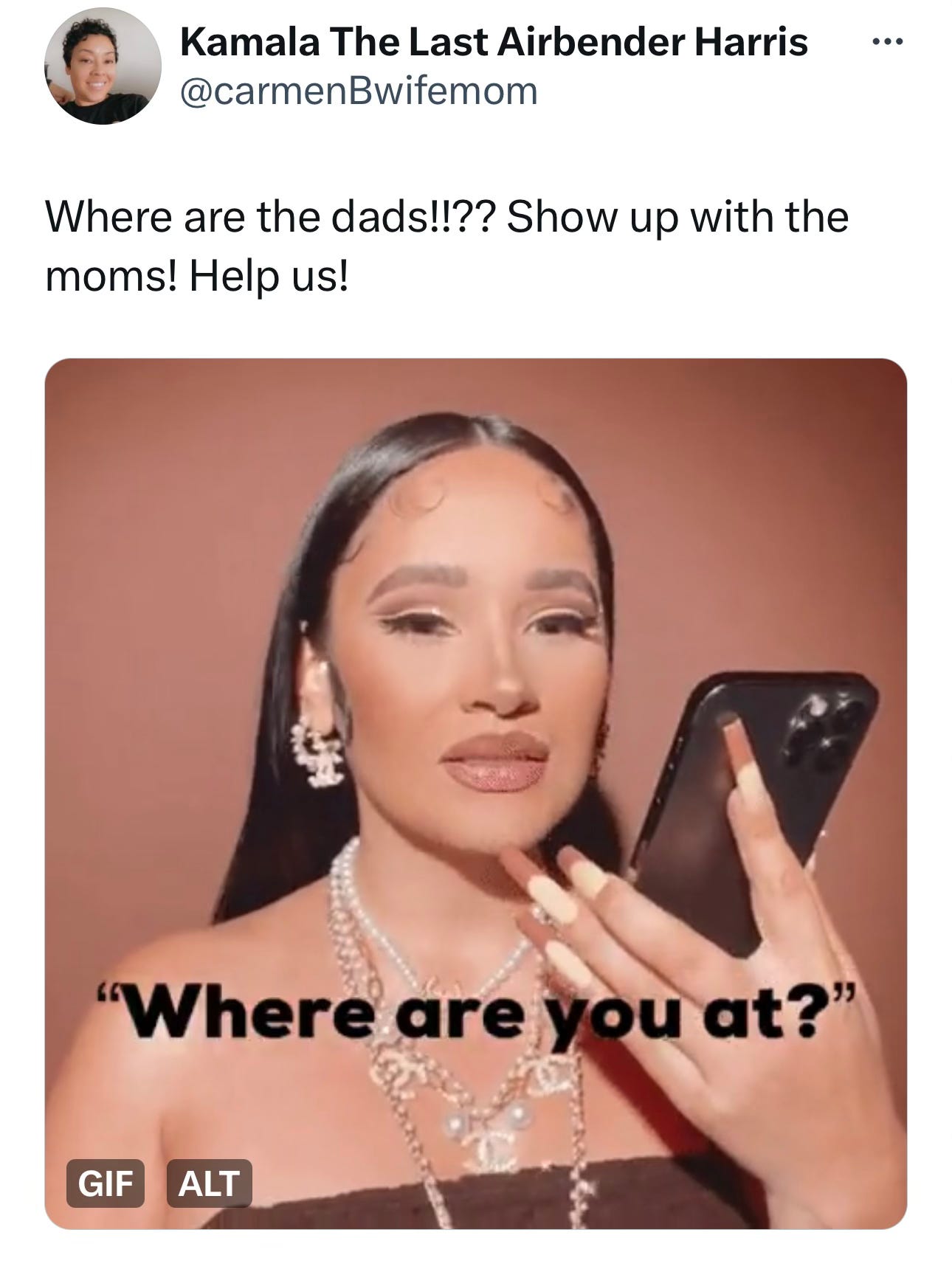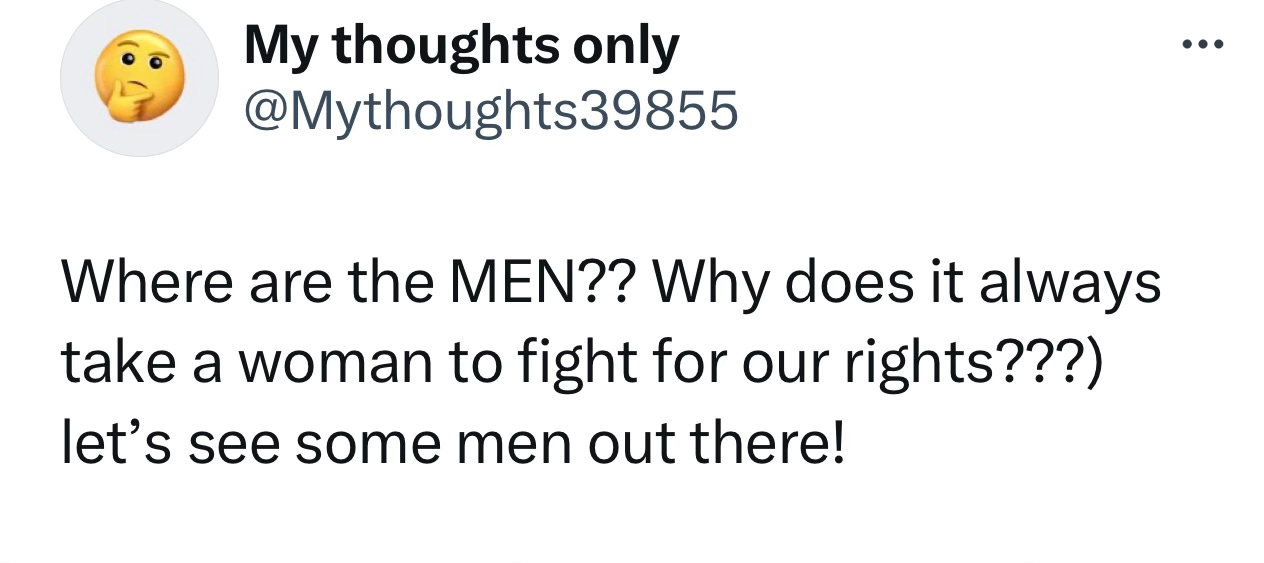"We don't have very prominent popular movements of ... men advocating for abortion rights or gun control or banning books... Pick your issue on either the left or the right. I don't think it's that [men are] difficult to organize. I think that their access to power is so institutionalized and diffuse that there's really no need for it. ...men tend to dominate. They don't have to [be activists] in a way that makes their identities overt mechanisms of their power. It's tacitly assumed that their power is conflated with their identities,” Soraya Chemaly, an author and activist who writes and speaks frequently on topics related to gender norms, inclusivity, social justice, free speech, sexualized violence, and technology.
Before starting Moms Demand Action as a Facebook page in 2012, I Googled “organization like Mothers Against Drunk Driving for gun control.” No relevant matches come up — just some links to think tanks in Washington, DC, mostly run by men, and some one-off city and state organizations, also mostly run by men. I didn’t know much about nonprofits or organizing back then, but I would come to learn that the men in these organizations often set the strategy and took the spotlight while women were expected to do domestic tasks like securing venues and making snacks and carry out the tactics that supported the strategy.
This is a pattern that’s been documented for decades. In many of the social movements in the 1960s, women were mostly assigned the mundane tasks associated with movement organizing — what researchers refer to as “movement housework” — while men held more prestigious and higher-profile leadership roles. For example, a 1998 study of an Ohio steelworkers’ strike showed that strike captains were more likely to select men for picket duty and women for kitchen duty.
To avoid that dynamic, I set out to create a grassroots organization where women were in charge of everything — soup to nuts. I wanted women to feel both ownership of and pride in their activism. And I assumed in the aftermath of a mass shooting inside an elementary school that American (cis/het) men would eventually either follow our lead or create their own organization. For the most part, that never happened. Sure, there are men who proudly wear Moms Demand Action shirts and allow women to lead them (shout out to those men!). And there are men who lead other, newer organizations (most of their volunteers seem to be women!). But even after getting Moms Demand Action off the ground, I was shocked at how difficult it was to get men to show up at hearings, rallies and meetings, let alone step into volunteer leadership roles. After all, many men are dads, too.
Over the years I’ve heard the excuse that, "The name Moms Demand Action isn’t welcoming to men,” but there are plenty of male members of Mothers Against Drunk Driving. And women belong to lots of organization that are majority male, even if the name man or dad isn’t in the title. I mean, I’m not a young Christian man, but I still have a YMCA membership. Besides, being turned off by the thought of being part of a moms organization doesn’t really explain why we don’t see scores of men showing up at statehouses to demand action on other issues, like abortion rights or childcare access or equal pay. There are plenty of non-mom organizations they could join, or they could simply show up on their own.
I’ve wondered if men mistakenly believe that women’s issues don’t impact them; or if their societal power makes them feel less impetus to act; or if, as some have suggested, men are busy “holding down the fort” while women do the heavy lifting of activism; or if society simply expects women to do the unpaid labor of volunteerism and men don’t see unpaid labor as a valuable use of their time…? After over a decade of activism on an issue that galvanizes the vast majority of our nation — not just women voters — I have a lot of questions about where the men are, but not a lot of answers.
So I asked feminist scholars like Soraya Chemaly for their input, and also all of you. I also asked my son and husband why they’re not involved in activism. Without specifically calling out anyone here by name, I will say I believe the most likely answer to “Where are the men?” is simply: men don’t feel the same urgency women do to try and force change because they benefit from the status quo.
As one reader put it, “I think you are getting close when you ask if men think the work of social activism is ‘Women’s Work.’ I am reminded of something Pastor Jonathan Old Horse told us at a Moms Demand leadership conference. I’m paraphrasing, but it was something like: '‘It is the women, not the warriors, who change society.’ I find these words to be deeply motivating, yet sometimes I feel like our house is on fire, my sisters and I are holding the hose, and our brothers are watching us, telling us how proud they are of us. We appreciate the encouragement, but we need them with us in the fight.’”
Another reader wrote, “Gut reaction — men expect the system to work for them. And usually the system does work for them. (Well, for white cis/het men). So why do the heavy work of coalition building and advocacy when it will all work out in the end anyway (from their perspective)? Of course, this ignores the fact that when things do ‘work out’ there is generally a lot of invisible labor happening.” And some additional reader insight here: “I am an executive in corporate America and I have seen all kinds of sexism from all sides. Women are asked to do menial work no matter the level. Therefore, we've created a structure where women must multitask, not seek a leadership position, and do menial work. Volunteerism is our only outlet for power.”
The male feedback I received was mostly focused on the conflict between cultural masculinity and the perceived emotionality of activism, “My first thought is that showing up for a women’s rights rally, to give hugs at PRIDE, or an anti-gun event might be seen as too ‘feminine’ for macho men,” one many wrote. “By feminine I mean emotional, caring, and nurturing, traits associated more with women than men. In other words, they don’t want their bros to see them crying. I think we are afraid to show that we care. It’s too vulnerable.”
In fact, a study on gendered activism shows male-dominated movements often adopt more confrontational (aka, less emotional) tactics than women do, including arguments, demonstrations and protests. In the United States, researchers have linked increased male participation in movements on both end of the political spectrum — from the Ku Klux Klan to the Earth Liberation Front — if they employ more confrontational protest tactics. Women, on the other hand, tend to adopt less confrontational protest tactics, including boycotts, petitions and discussions (as an aside, researchers studying movement outcomes found that nonconfrontational forms of protest are actually associated with movement success).
There’s also research that shows while men may actually want to become activists or support an issue, they fear they won’t be taken seriously because they lack a vested interest in the cause (for example, abortion or equal pay). Research by a pair of psychologists-turned-business-professors at the University of Maryland and Stanford shows that such fears are not unfounded. Across a series of studies, when men took action to promote women’s rights, respondents expressed surprise and anger. In fact, both male and female respondents displayed shock and resentment toward the men: What business did they have speaking up for women?
But men do need to speak up, despite any backlash (women are already experts on backlash online and in real life — we have tips for you!). And we need more men doing the unglamorous, heavy lifting of grassroots activism. We need more men showing up at hearings, holding and attending meetings and handing out literature at farmers markets. Activism is often about strength in numbers and we can’t and won’t win until all Americans prioritize and vocalize the importance of advocacy. I’d love for you to share your potential solutions to this dilemma in the comments; in the meantime, here are some of my own:
Communicate with the women and girls: Listen to your friends and family members who are activists. Ask them how you can offer support and look for ways to act in solidarity. While the system may be working for you, learn about how it’s not working for others.
Start with yourself when joining a movement: Question your behavior and realize the gender-based stereotypes you may be applying to activism. So much invisible labor is performed by women — many of us are daughters, wives and mothers and there are tasks associated with all of those roles (on top of our volunteer role as activists). Bring your heart and mind, but also your ears.
Find an issue you’re passionate about and get involved: Support and volunteer for the associations, organizations, and platforms that advocate in your community — even if, and especially if, they’re run by women. Then bring others men with you.
Don’t give advice unless requested: I could write a memoir just about the mansplaining I’ve endured over the past decade. As one reader wrote, “As someone who's been doing Moms Demand welcome calls for years, what I've observed is that, quite often, the women who pick up the phone are in a hurry or in the middle of something and don't have a lot of time to talk. On the other hand, many of the men who pick up are interested in telling me how Moms could ‘do what we do better.’”
It’s ok to show emotion: One reader wrote this about her husband: “I don’t think he can sit with the uncomfortable emotions of doing this work. He shuts down emotionally.” Being sad or frustrated or overwhelmed doesn’t make you weak, it makes you human. And activism — coming together with a community of likeminded people — will ultimately bring you joy! Remember it’s ok to talk about your emotions with your partner, friends or a therapist.
Show up: Women are busy, too! If activism is a priority, find a way to make time for it. We don’t just need you to plan — we need you to implement.
Be ok doing menial labor: If you can buy drinks and donuts or set up chairs or sign people in, that’s half the battle of activism!
Ask your sons and brothers and friends to join you: Be a role model and maybe — one by one — we’ll see more men participating in activism.








I provided some thoughts on this in the past, but I have some additional thoughts after participating in PA Annual Advocacy Day last Wednesday. Immediately after the group photograph (in the capitol rotunda), another man asked me "why don't the men have a similar organization"? This left me a little perplexed because Moms Demand Action is an organization that already exists for that purpose. And I was there, so I knew men were welcome and needed. The misanthropic part of me, which prefers wildlife, believes most men are a combination of assholes and blockheads. They need to be called upon. It needs to be spelled out. And their apprehensions or concerns need to be quelled. I know this because I consider myself an empath and I see and feel things differently than most of my male coworkers, friends, and acquaintances. I DON'T have children (almost did) yet I joined Moms Demand Action to do my part to protect children. Could, perhaps, Moms Demand Action hold male-specific recruiting events?
I have become so pessimistic about men and I’m married to a good one. 😞
You hit the nail on the head about how they’ve never had to be activists because white men have always had power or access to it. I tell every woman I speak to, the men aren’t coming to save us; It’s us. Women have to fight like our lives and our children’s lives depend on it because it does!
We will have to save ourselves with or without the men’s help. I hope I live to see a female president and a mostly female SCOTUS. 🙏🏻